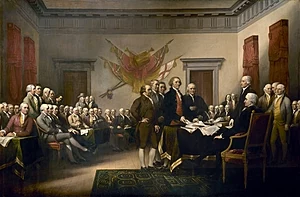
Of all the freedoms guaranteed in the Bill of Rights, nothing confounds a Free people more than the Freedom of the Press. 245 years of responsible gun-ownership proves that the free Press is by far a greater danger than guns to our ability to remain a free people.
There are two more scheduled debates, so the viewers’ main takeaway from Debate #1, as the Press will describe it going forward, will be about the rude misconduct of Trump primarily. But the alternate takeaway, which I suggest, “What to do about The Press?” And should this become a Trump campaign issue going forward?
Well, yes and no, since I believe the Free Peoples base can deal with this on our own.
This “danger from the Press” has been known in America and Britain for a very, very long time. Still, there it is in the First Amendment:
“Congress shall make no law respecting an establishment of religion, or prohibiting the free exercise thereof; or abridging the freedom of speech, or of the press; or the right of the people peaceably to assemble, and to petition the Government for a redress of grievances.”
Are we seeing a “free press” at work today? A press that speaks only to, and for, the top 20% of American society? The government class, the management class?
Thomas Jefferson in particular was adamant about the importance of a Free Press. And, although he had nothing to do with the drafting of the Bill of Rights, or how they were “ranked”, as the Ten Commandments were ranked, the first four dealing with Man’s relationship with God, (the “thou shalts”) for which there is only One Judge, Jefferson, the master architect knew how the design was supposed to work. So when he talked about a Free Press he had a particular piece of social machinery, in mind.
Below I’ve included several observations about the Press from G K Chesterton, the English philosopher and (Catholic) theologian, made from 1906-1930. Three caveats need to be noted:
- No Englishman had no natural law right to own and possess arms as our 2nd Amendment;
- The English maintained their class-system built on aristocracy, and in the 250 years since America has thrown off the English yoke, we have steadfastly refused to adopt it.
- The Americans, compared with England, had watered-down personal protections against defamation, slander and libel directed at an individual.
Jefferson’s American ideal of a free Press was that any man could publish anything he wanted about anyone or anything restrained only by common law prohibitions about defamation, slander and libel. (Lies) Most American cities had two dailies at least (New York City several) so that the public had access to the news spun according to their tastes, including radicals, anarchists and communists. (The Daily Worker, a mouthpiece for worldwide communism, 1924-58, shown above on its last day in 1958, reached out to fewer than 50,000. Today collectivist Marxism-corporatist Fascism…the jury’s still out as to which will prevail…fully aided and abetted by the corporate mainstream Press, reaches, even controls, the thinking of several million.) By the 1970s when for a variety reasons, family-owned papers were convinced to sell to conglomerates, with “corporatized” front offices. Now 90% of all media including newspapers, are owned by 6 media conglomerates. And most cities only have one Press voice.
No more competition.
With this background, let me provide some general observations on “the Press” by G K Chesterton in the last century.
(1923) “I do feel very strongly about the frivolity and irresponsibility of the Press. It seems impossible to exaggerate the evil that can be done by a corrupt and unscrupulous press…bad journalism does directly ruin the nation; it acts on the corporate national will and sways the common national decision. It may force a decision in a few hours that will be an incurable calamity for hundreds of years.
(Published in 1956) The whole modern world, or at any rate the whole modern Press, has a perpetual and consuming terror of plain morals.
My friends in Manchester are in a terrible state of excitement about the danger of a local brewer being admitted to public office. But at least, people generally know it. But a man may control politics through journalism and not ordinary citizen ever knows he is controlling them at all.
The Yellow Press is exaggerated, over-emotional, illiterate and anarchical and a hundred other long word; where as the only objection to it is that it lies.
(1917) The point about the Press is that it is not what it is called. It is not the “popular press”…it is not an organ of public opinion. It is a conspiracy of a very few millionaires, all sufficiently similar in type to agree on the limits of what this great nation may know about itself and its enemies.
(1908) If you never believe the Press and if you always believe private gossip, you will more probably be right,
It is the duty of the Press to expound, and occasionally to expose. Rarely, very rarely, it is its duty to suppress, although this is almost the only duty it still performs with gusto.
(1910 amended from Darwin to Marx) The things which newspapers call startling are things the real people in the world have long ago ceased to be startled at. To journalists Marx is still a novelty, while to historians he is an antiquity, and even a rather disproven and damaged antiquity.
(1922) It seems impossible to exaggerate the evil that can be done by a corrupt and unscrupulous Press. It acts on the corporate national will and sways the common national decision. It may force a decision in a few hours that will be an incurable calamity for hundreds of years. It may drive a whole civilization to defeat, to slavery, to bankruptcy, to universal famine. (ONE NOTE: America has a Second Amendment. England does not.)
(1928) the very fact that we see a remark (or fact, or statement) made a hundred times in the Press is normally a very good reason for seriously considering whether the opposite is not true.
(1922) It is convention of journalism at the this moment to support what it feminist against what is feminine.
(1908) All that everybody really meant as the evil of gossip is much more characteristic of established journalism (versus back-fence whispers). The fact that gossip comes from nowhere in particular, and from everywhere at once; that no name can be put on it as to name a source, that you cannot run it to earth, but when you attempt to contradict it strange obstacles of entanglement and denial seem to cross your path. All this which is so true of private scandal is very much truer of public journalism.
The frivolous chatter is now all in public journalism. The public responsibility is all in private conversation.
(1925) Journalism’s syndications and distributions are all founded on the feeblest of fallacies. It is the notion that you can make a stale thing fresh simply by repeating it.
(1921) It seems possible that popular journalism (ed: Twitter-borne: HuffPo, Atlantic, Newsweek, Slate, et al) may become unpopular merely by pursuing popularity. A baby has a fine intellectual disdain for people who talk baby talk. A schoolboy feels a grave and dignified disapproval of those speaking in what they suppose is schoolboy slang.
And I fancy the ordinary citizen will soon get tired of being talked down to with the same supercilious superficiality.
(1953) Journalists do control public opinion; but it is not controlled by the arguments they publish—-it is controlled by the arguments between the editor and sub-editor, which they do not publish.
“Blessed are they who have not see and yet have believed” (John 20:29)
–a passage which some have considered a prophecy of modern journalism.




